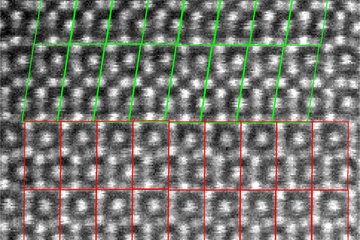All genres
101.
Talk
Towards high throughput melting property calculations with ab initio accuracy aided by machine learning potential. CALPHAD L Conference, Cambridge, MA, USA (2023)
102.
Talk
Materials Design in High Dimensional Chemical and Structural Configuration Spaces. TMS 2020 Annual Meeting & Exhibition, San Diego, CA, USA (2020)
103.
Talk
Ab Initio Phase Stabilities of High Entropy and Chemically Complex Alloys. TMS Annual Meeting, San Diego, CA, USA (2020)
104.
Talk
Construction and exploitation of large ab initio data spaces to design materials with superior mechanical properties. MRS-J: Materials Research Meeting 2019, Yokohama, Japan (2019)
105.
Talk
Ab initio descriptors to design materials with superior mechanical properties. Materials Day, ETH Zürich, Zürich, Switzerland (2019)
106.
Talk
Phase stability and mechanical properties of high entropy and chemically complex alloys. MS&T Annual Meeting, Portland, OR, USA (2019)
107.
Talk
Ab initio input for multiphysics models: Accuracy, performance and challenges. ISAM4: The fourth International Symposium on Atomistic and Multiscale Modeling of Mechanics and Multiphysics, Erlangen, Germany (2019)
108.
Talk
Computing and modelling solute-grain boundary interaction. Canadian Materials Science Conference, Vancouver, Canada (2019)
109.
Talk
Melting parameters from ab initio using the fast statistical sampling TOR-TILD approach: Applications to Al and Ni. CALPHAD XLVIII CONFERENCE, Singapore, Singapore (2019)
110.
Talk
Exploiting large ab initio data spaces to design materials with superior mechanical propertiess. 2019 BIOVIA User Conference, Düsseldorf, Germany (2019)
111.
Talk
Modelling structural materials in realistic environments by ab initio thermodynamics. Hume-Rothery Award Symposium, TMS2019 Annual Meeting and Exhibition, San Antonio, TX, USA (2019)
112.
Talk
Exploiting large ab initio data spaces to design materials. Openning of Christian Doppler Laboratory for nanoscale phase transformations, Linz, Austria (2019)
113.
Talk
Exploration of large ab initio data spaces to design materials with superior mechanical properties. Physics and Theoretical Division Colloquium, Los Alamos, NM, USA (2019)
114.
Talk
Strain rate sensitivity of dislocation transmission through individual copper grain boundaries. E-MRS Spring Meeting 2018, Strasbourg, France (2018)
115.
Talk
Efficient approach to compute melting properties fully from ab initio with application to Cu. CALPHAD XLVII Conference, Querétaro, México (2018)
116.
Talk
Knowledge driven engineering of materials: Development and application of ab initio based scale bridging methods. Seminar at HSU Hamburg, Hamburg, Germany (2018)
117.
Talk
Efficient and Accurate Computation of Melting Temperatures and Enthalpies and Entropies of Fusion from Ab Initio. TMS conference, Phoenix, AZ, USA (2018)
118.
Talk
Phonon broadening in high entropy alloys. TMS 2018, Phoenix, AZ, USA (2018)
119.
Talk
Dislocation-twin boundary interactions in nanoscale Cu bi-crystals: Simulation versus experiment. Schöntal Symposium - Dislocation based Plasticity, Schöntal, Germany (2018)
120.
Talk
Knowledge driven engineering of materials: Development and application of ab initio based scale bridging methods. Seminar at University Stuttgart, Stuttgart, Germany (2017)











